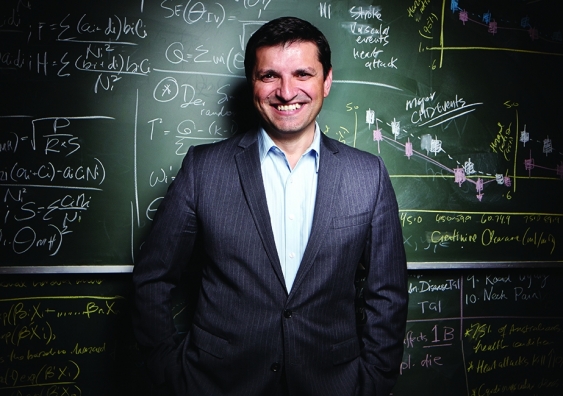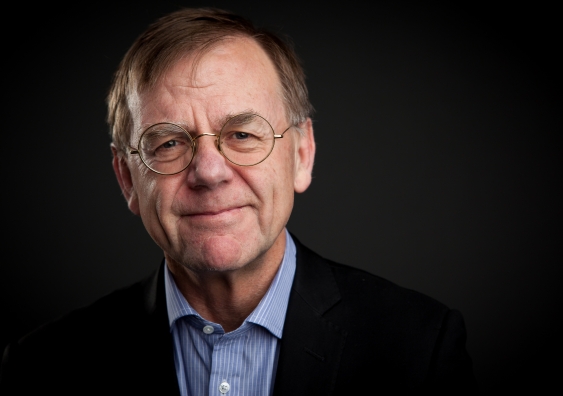UNSW appoints new Dean of Medicine
The former Executive Director of The George Institute for Global Health, Professor Vlado Perkovic, starts as UNSW’s new Dean of Medicine today.
The former Executive Director of The George Institute for Global Health, Professor Vlado Perkovic, starts as UNSW’s new Dean of Medicine today.

Lucy Carroll
UNSW External Communications
9385 8732, 0402 005 319
l.carroll@unsw.edu.au
It was an eleventh-hour change of university preference that led Vlado Perkovic to a career in medicine. That change would eventually see him become one of Australia’s top kidney disease specialists, leading some of the world’s largest clinical trials in the treatment and prevention of kidney failure and its many complications.
“After graduating high school, I applied to do a combined Science/Law degree,” says Professor Perkovic.
“I’ve always loved science, but I also enjoy the human element, the personal connection. How science affects people’s lives. And I realised that a career in medicine would give me a combination of the two.”
The pivotal application switch to study medicine led to a quick succession of achievements: a bachelor’s degree; specialist training and a PhD from the University of Melbourne; positions as a nephrologist and general physician at some of Australia’s leading hospitals; and leader of large-scale clinical trials at major medical institutes.
In October – after more than two decades in research and leadership positions at The George Institute for Global Health – Professor Perkovic will take up the role of Dean of Medicine at UNSW Sydney.
He succeeds Professor Rodney Phillips, who will move to the new role of Pro Vice-Chancellor, Health within the Division of Enterprise at UNSW, after four and a half years leading the Faculty.

Professor Rodney Phillips. Photo: Miles Standish
“This is a challenging and exciting time to take on the role of Dean,” says Professor Perkovic. “The role will offer many opportunities to make a difference to people’s health and how we train the doctors of the future. Some of the massive global challenges that we're facing in health and in education – from the epidemic of obesity to the need to manage comorbidities as people live longer – create enormous possibilities to make a real impact.
“Medical schools have a mandate to help society move forward and tackle our collective challenges. To be progressive, address inherent disadvantages in the health system, harness underused technology, improve health care in remote areas and be a part of a global community that helps people wherever they live,” he says.
“The development of UNSW’s partner hospitals in the south-east and south-west of Sydney is critical in allowing universities and researchers to connect with community. With these developments, we will be uniquely placed with the largest co-located health, innovation and education zone in NSW. This integration with adjacent Randwick hospitals will put the faculty at the forefront to deliver improved health care of the future.”
After training as a general physician in internal medicine and specialising in nephrology at Royal Melbourne Hospital – “I loved hospital pace, but it was long hours and constant on call” – Professor Perkovic was pulled toward a career in medical research. He has since published more than 200 peer-reviewed papers, which have produced major findings identifying better ways to prevent and treat kidney disease, including multiple clinical trials and meta-analyses.
“Specialising in kidney disease gave me a chance to make a real difference to patients’ lives. It is a rare area of medicine where people can be incredibly sick, with terrible quality of life, and after a kidney transplant, they just come alive. It’s incredible to be part of, and something I still really enjoy.”
Following his PhD in 2005, he moved from Melbourne to Sydney to take a senior position at The George Institute and lead international trials that have made fundamental advances in the field and changed global treatment guidelines for kidney disease. He was appointed Executive Director of The George Institute and Professor of Medicine at the University of Sydney in 2012, Professor of Medicine at UNSW in 2017 and played a central role in developing an affordable dialysis system, which was a Eureka Prize finalist in 2017. Leading the 2019 CREDENCE trial, an international study that discovered a treatment that reduced kidney failure rates by a third, was one of the major highlights of his career, he says.
“Clinical trials are the best way of proving what works in medicine. Being a part of a trial that is lifesaving for millions of people around the world has been a privilege. It really helped me develop a leadership role globally – suddenly we could achieve benefits that were beyond my wildest hopes.”
Nephrology clinical research and interest in epidemiology and clinical trials stemmed, he says, from a very early aptitude for maths and science.
'Some of the massive global challenges that we're facing in health and in education – from the epidemic of obesity to the need to manage comorbidities as people live longer – create enormous possibilities to make a real impact.' – Professor Vlado Perkovic
“Nephrology is numbers-based, and I love numbers. Maths and science were my strongest subjects in school and the opportunity to combine them in a career in medicine and scientific research was incredibly exciting.”
Professor Perkovic was born in Brinje, Croatia and his family left Europe in the late 1960s, moving to Australia before he turned one.
“My parents left Croatia as refugees and eventually ended up in the north-western suburbs of Melbourne. I lived and went to school in St Albans and Sydenham, which were very rough places in many ways back then, but extremely diverse as well. At the local schools, people born in Australia were a minority and I didn’t speak English until I started kindergarten. I spent a couple of years at a local high school before my parents moved me to a regional Catholic college that was more academically focused. It really helped me understand the importance of environment to the ability to learn.
“By the time I got to my HSC, I was doing well. But I didn't know anyone who was in medicine, and the only contact I had with the medical profession was occasional trips to the local GP.
“I’ve been taking opportunities as they appear through my career, but I never thought I'd be a doctor; never thought I'd specialise. I never thought I'd do research. I certainly never thought I'd be in the position of Dean,” says Professor Perkovic.
President and Vice-Chancellor of UNSW Sydney, Professor Ian Jacobs, congratulated Professor Perkovic on the new appointment and highlighted Professor Perkovic’s breadth of experience in leadership roles.

UNSW President and Vice-Chancellor Professor Ian Jacobs.
“Professor Perkovic is one of the nation’s top kidney disease experts and a leader in translating high impact research into outcomes for patients that have had a major effect on the lives of people around the world,” Professor Jacobs said.
“Having successfully led the Sydney hub of our partner The George Institute, which is one of Australia’s largest medical research institutes, Professor Perkovic will bring enormous experience to his role as Faculty Dean. We have exciting and ambitious plans for the Faculty during Professor Perkovic’s time as Dean as we shape the Faculty and University to play a prominent role in addressing global, national and local healthcare challenges.”
Professor Jacobs acknowledged the quality of the work of Professor Phillips in leading the Faculty for almost five years.
“UNSW Medicine is one of the world’s top medical faculties and our students, clinicians and researchers have prospered under Professor Phillips’ leadership. I am grateful to Professor Phillips for his stellar contribution which includes bringing the George to UNSW and assisting with plans for our Randwick Health and Education Precinct. I am delighted that he will continue at UNSW in the role of PVC Health with particular responsibility for the new precinct.”
For a full biography of Professor Perkovic, go to the UNSW Medicine website.